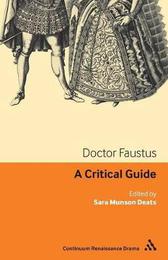
|
Doctor Faustus: A critical guide
Paperback / softback
Main Details
Description
Doctor Faustus, is Christopher Marlowe's most popular play and is often seen as one of the overwhelming triumphs of the English Renaissance. It has had a rich and varied critical history often arousing violent critical controversy. This guide offers students an introduction to its critical and performance history, surveying notable stage productions from its initial performance in 1594 to the present and including TV, audio and cinematic versions. It includes a keynote chapter outlining major areas of current research on the play and four new critical essays. Finally, a guide to critical, web-based and production-related resources and an annotated biography provide a basis for further individual research.
Author Biography
Sara Munson Deats is Distinguished University Professor of English and Co-Director of the Center of Applied Humanities at The University of South Florida, USA. She has published widely on Marlowe and Shakespeare, has served as President of the Marlowe Society of America, and in 1998 received the international Roma Gill Prize for Outstanding Contribution to Marlowe Scholarship.
Reviews"This volume represents much of the star power in Marlowe Studies over recent decades, including three past presidents of the Marlowe Society of America along with two current officers. Readers may be assured that the scholarly assessments in this volume are well informed, judicious, insightful, and forward-looking." - Roslyn L. Knutson, Professor Emerita, University of Arkansas at Little Rock, USA; President, Marlowe Society of America "This wide-ranging book provides food for thought for readers of all levels: it helps orient the beginner with useful surveys of the critical territory and it caters to more advanced readers with stimulating scholarly essays on topics such as postcolonialism, print culture and the occult. Andrew Duxfield approaches Renaissance hermeticism in an admirably clear and user-friendly way; Georgia Brown imaginatively examines writing/printing as both a context for and a theme of the play; and Andrew Hartley's experience of directing Dr Faustus provides brilliant and pithy insights about the play's theatricality and applicability to audiences and readers today. There are extensive (and helpfully annotated) reading lists to guide all readers through the critical maze. Every chapter is full of useful information and observations. This is a valuable addition to the library of every school or university - and to the bookcase of every student." - Laurie Maguire, Professor of English, University of Oxford, UK "Doctor Faustus: A Critical Guide offers meticulously detailed and lucid overviews of the vexed textual, critical, and performance history of Marlowe's most widely read and performed play, devoting an entire chapter to recent trends in scholarship and interpretation. For these reasons, and because of its deliberate emphasis on the relatively neglected area of performance studies of Doctor Faustus, it is an exceptionally ambitious and valuable work." - Constance Brown Kuriyama, Professor of English, Texas Tech University, USA "Scholars of English literature introduce students to some features of the play written by British playwright Christopher Marlowe (1564-93) in 1588, the year of the Spanish Armada. They cover the critical backstory, the performance history, current critical research, Renaissance hermeticism, imperialism as devilry in a postcolonial reading, staging Faustus on campus, and the other black arts of printing and writing. A final chapter surveys resources." -Eithne O'Leyne, BOOK NEWS, Inc. This guide offers a clear picture of the critical landscape of past and current scholarly research on Doctor Faustus, both textual and performative... the volume is a useful resource for students and for scholars who are either just beginning their research or interested in surveying the various rudimentary critical scholarship of the day. -- Sixteenth Century Journal '[This book] aiming to be useful to teachers and students, views the play from varied perspectives. Starting with a useful "Timeline," which begins with Marlowe's life and continues to the present, cataloguing significant stage and publication history, it includes an introduction and eight chapters.'-The Shakespeare Newsletter The guide serves a dual purpose, offering on the one hand survey chapters detailing the critical and performance heritage, current critical trends, and available resources, and on the other, four 'New Directions' chapters which engage in original critical and contextual analysis of the play. Deats's introduction, as well as providing an overview of the volume's contents, offers the reader a grounding in the play's historical and literary sources and a broad account of the critical divide between orthodox moralistic and tragic heroic interpretations of the play. * Years Work in English Studies, vol 91, no 1, 2012 *
|